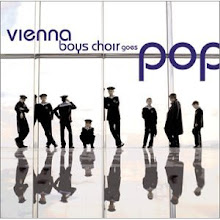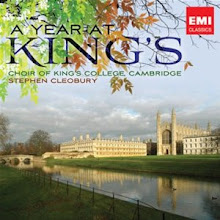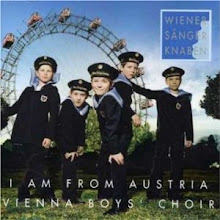I’ve wanted to say something for a while now about a CD from the Choir of King’s College, Cambridge titled Credo. The trouble is I can’t find a lot to say about it. It’s a 1997 album that was recorded in their chapel and it has great resonance, but it’s been around for bit so I can’t find any information on the internet that refers to it. All I can go by is the booklet that came with the CD.
It says that the Eastern and Western churches have been separated since 1054 and this album looks at the common heritage of both churches.
Apparently the Orthodox East and the Latin West couldn’t agree over the contention of a word ‘Filioque’ which is “the assertion that the Holy Spirit proceeds from the Son as well as the Father”.
That seems like a pretty small reason for a schism. I would have thought that Christians would say, “You may very well be right. We’re just guessing anyway and what does it really matter?”
It’s all beyond me since I know nothing about either the East or the West. I just like the music. This is some hard-core cathedral music, too, with the eastern Europeans represented by Rachmaninov, Stravinsky and Penderecki while the burden of representing the west falls solely on the shoulders of Andrzej Panufnik, a Pole who made his career in England.
Actually, some of the pieces like Credo and Ave Maria are done in both Plainchant and a Stravinsky version so I assume the Plainchant is western. Also, Blessed is the Man and Praise the Lord, O My Soul are from the Common Book of Prayer.
There are 3 versions of The Lord’s Prayer.
All of the songs and chants are done without music and most are very slow. The vocals are sophisticated and complex with some beautiful decorations.
I like to listen to this when I’m doing housework, some very slow housework, but there are times when I just have to stop and focus on the music. In the right mood this can be very moving.
Tuesday, September 29, 2009
Subscribe to:
Post Comments (Atom)













Besides the Filioque there were snags over the issue of "papal primacy"/role of the bishop of Rome...but as an Anglican I will say no more about that!
ReplyDeleteMusically, the division means that the East turns to different traditions in addition to/in place of Gregorian Chant, and it also means that elements like Palestrina--so critical to the development of church music in the Vatican--are not experienced in the East...as a result, the East have a markedly different sound in some respects from the West.
Hope this helps!
WOW SO GOOD TO FIND YOU AGAIN MY COMPT. HAS ITS OWN MIND
ReplyDeleteThanks Kelsie, I had a feeling there was more to it. I can see some of the differences in music between East and West. There were parts of some songs on this album that sounded so Russian.
ReplyDelete